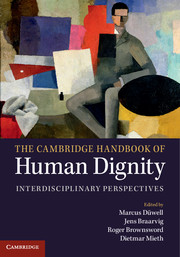Book contents
- Frontmatter
- Contents
- List of contributors
- Foreword
- Why a handbook on human dignity?
- Acknowledgments
- 1 Human dignity from a legal perspective
- 2 Human dignity: concepts, discussions, philosophical perspectives
- Part I Origins of the concept in European history
- Part II Beyond the scope of the European tradition
- Part III Systematic conceptualization
- Part IV Legal implementation
- Part V Conflicts and violence
- Part VI Contexts of justice
- Part VII Biology and bioethics
- 57 The threefold challenge of Darwinism to an ethics of human dignity
- 58 On the border of life and death: human dignity and bioethics
- 59 Human dignity and commodification in bioethics
- 60 Dignity only for humans? A controversy
- 61 Dignity only for humans? On the dignity and inherent value of non-human beings
- 62 Human dignity and future generations
- Appendix 1 Further reading
- Appendix 2 Universal Declaration of Human Rights
- Index
- References
59 - Human dignity and commodification in bioethics
from Part VII - Biology and bioethics
Published online by Cambridge University Press: 05 March 2015
- Frontmatter
- Contents
- List of contributors
- Foreword
- Why a handbook on human dignity?
- Acknowledgments
- 1 Human dignity from a legal perspective
- 2 Human dignity: concepts, discussions, philosophical perspectives
- Part I Origins of the concept in European history
- Part II Beyond the scope of the European tradition
- Part III Systematic conceptualization
- Part IV Legal implementation
- Part V Conflicts and violence
- Part VI Contexts of justice
- Part VII Biology and bioethics
- 57 The threefold challenge of Darwinism to an ethics of human dignity
- 58 On the border of life and death: human dignity and bioethics
- 59 Human dignity and commodification in bioethics
- 60 Dignity only for humans? A controversy
- 61 Dignity only for humans? On the dignity and inherent value of non-human beings
- 62 Human dignity and future generations
- Appendix 1 Further reading
- Appendix 2 Universal Declaration of Human Rights
- Index
- References
Summary
The meaning of human dignity
This chapter is concerned with how the concept of human dignity relates to the current debates in biomedical ethics about the commodification of the human body and its parts. Before considering the specific topics dealt with in this discussion, I shall clarify how I am using the term ‘human dignity’. In accordance with the approach of this volume as a whole, my use depends on the way in which the concept functions in the Universal Declaration of Human Rights (UDHR) of 1948. It appears in the very first sentence of the Preamble to the Declaration:
Whereas recognition of the inherent dignity and of the equal and inalienable rights of all members of the human family is the foundation of freedom, justice and peace in the world…
As this wording makes clear, dignity is closely aligned to human rights, but also to the human family – not merely to the rights of individual members. This emphasis on human solidarity will be very important for my exposition of the issues in the current move towards the commodification of human bodily materials through what has been called the ‘tissue economy’ (Waldby and Mitchell 2006). In the decades since the UDHR was adopted, biomedical ethics developed dramatically in the United States and other Western nations; however, the debate rapidly seemed to place the sole focus on a notion of autonomy, narrowly understood as the individual's capacity of free choice. Such a narrow focus cannot be justified if we look at the detailed requirements of the UDHR, based on the core concepts of inherent dignity and equal and inalienable rights. Just a few of the specific requirements of the UDHR illustrate this:
Article 1: All human beings are born free and equal in dignity and rights. They are endowed with reason and conscience and should act towards one another in a spirit of brotherhood.
Article 25: Everyone has the right to a standard of living adequate for the health and well-being of himself and of his family, including food, clothing, housing and medical care and necessary social services, and the right to security in the event of unemployment, sickness, disability, widowhood, old age or other lack of livelihood in circumstances beyond his control.
Article 29: Everyone has duties to the community in which alone the free and full development of his personality is possible.
- Type
- Chapter
- Information
- The Cambridge Handbook of Human DignityInterdisciplinary Perspectives, pp. 535 - 540Publisher: Cambridge University PressPrint publication year: 2014

